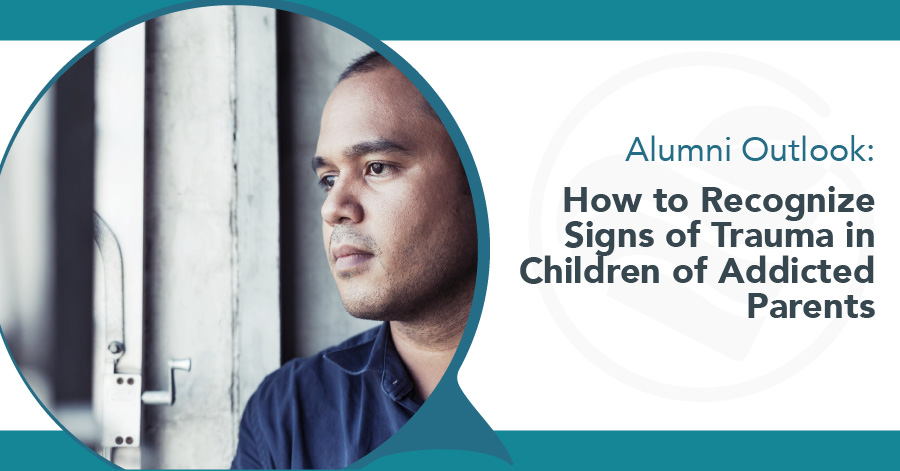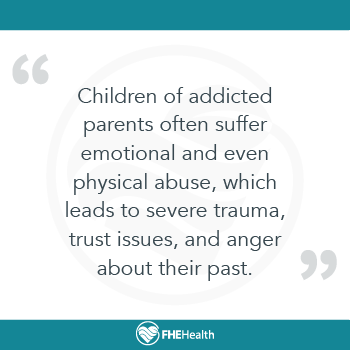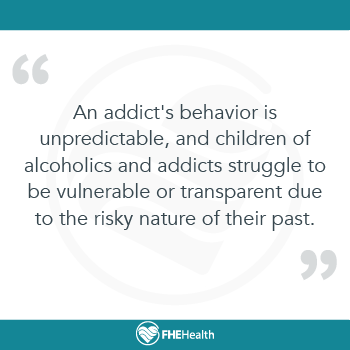
Regardless of age, we are always influenced by our parents. These influences are not solely the genetic factors inherited from our biological parents, but also their behaviors, habits, morals, and communication skills we learn from our caregivers. Life with an alcoholic and/or drug addicts and be unpredictable, stressful, and traumatic. The highs and lows of living with an addicted loved one can be extremely difficult for anyone, especially children. Family members often feel like they are living in a war zone. The trauma within the family dynamics of an addicted parent and a child can leave lasting behavioral and mental effects such as depression and PTSD. Recognizing the signs and early intervention is the key to ending the cycle of addiction for children of addicted parents.
The National Institute on Drug Abuse estimates that 25% of American children grow up in households where substance abuse is present. Homes, where one or more adults are addicted to drugs or alcohol, are twice as likely to cultivate children that develop addictive disorders. Furthermore, these children are also expected to experience:
- Higher risk of developing depression
- Low self-esteem
- Poor performance in school
- Emotional and behavioral issues
- Higher risk of physical, sexual, or verbal abuse
- A predisposition of becoming an addict
- Higher risk of developing an anxiety disorder
Signs of Trauma: Helping the Addicted Parent
A healthy parental relationship consists of taking on the caregiver’s role, providing emotional support, providing physical shelter, and financial security for their child. However, parent-child relationships that involve substance abuse often lead to reversing these roles, and the child becomes the caregiver. More often than not, the child doesn’t even realize he/she is taking on the parental/caregiving role.
Here are a few signs of excessive emotional engagement and role reversal amongst children of addicted parents.
- Taking care of the addicted parent, i.e., making sure the parent eats, cleaning up after a rough night of drug use, and even financially helping the parent.
- Canceling functions and extracurricular activities with friends to stay home with a parent who is codependent and addicted.
- Listening to the parent recount extreme stories of sexual encounters and risky behaviors that he/she had while intoxicated.
- Experiencing extreme symptoms of PTSD when encountering a trigger.
- Taking on the responsibility of rescuing a parent who is experiencing isolation, depression, or suicidal thoughts.
- Sleeping in the same bed with a parent who is codependent, anxious, and fearful of being alone.
- Attempting to create an emotional bond with a parent to create an emotional bond.
- Taking on the responsibility and blame for the parent’s addiction.
These unhealthy responses reflect the child’s assumed level of maturity that he/she may not be ready for. Parents suffering from drug or alcohol addiction are often codependent, and in turn, the child is unable to develop the independence they need. The child ultimately becomes an expert caretaker who lacks social skills and a true sense of self. The emotional stress of a child having to care for themselves and an addicted parent often causes damage to brain development. Furthermore, children who must care for themselves due to an addicted parent poses a much higher risk of injury, exposure to crime, malnutrition, isolation from peers, risky behavior, and PTSD.
Dysfunctional Parenting Causes Codependency and Trauma
 Addicted parents are often unreliable, inconsistent, and unpredictable. The children never have a real sense of safety and consistency, preventing them from thriving. Children of addicted parents often suffer emotional and even physical abuse, which leads to severe trauma, trust issues, and anger about their past. These children often feel their needs and feelings are ignored. Often, they are embarrassed to entertain friends as they suffer from shame, guilt, and loneliness.
Addicted parents are often unreliable, inconsistent, and unpredictable. The children never have a real sense of safety and consistency, preventing them from thriving. Children of addicted parents often suffer emotional and even physical abuse, which leads to severe trauma, trust issues, and anger about their past. These children often feel their needs and feelings are ignored. Often, they are embarrassed to entertain friends as they suffer from shame, guilt, and loneliness.
Codependency
Many children of addicted parents become extremely self-reliant or super codependent. An addict’s behavior is unpredictable, and children of alcoholics and addicts struggle to be vulnerable or transparent due to the risky nature of their past. These children often become hypervigilant and distrustful as they learn to contain and deny their emotions, which may lead to codependency. Furthermore, children of addicted parents may be so detached that they become numb to their own feelings.
Trauma
Many children of addicted parents develop trauma symptoms of PTSD in which painful memories and flashbacks are similar to a war veteran. The physical health of the child may also be impacted. The Adverse Childhood Experiences study revealed the direct correlation between harmful health complications and childhood trauma. Children of addicts and alcoholics commonly experience multiple adverse experiences due to the nature of substance abuse.
Helping Children of Addicted Parents Overcome Trauma
 What is taken away from a child in place of a parent’s addiction is challenging to get back, but as a sober or recovering parent, you can find a way to help them heal. It is essential to restore freedom, confidence, love, and hope into their lives. To help children of addicted parents overcome their trauma, there are many things you can do to facilitate healing.
What is taken away from a child in place of a parent’s addiction is challenging to get back, but as a sober or recovering parent, you can find a way to help them heal. It is essential to restore freedom, confidence, love, and hope into their lives. To help children of addicted parents overcome their trauma, there are many things you can do to facilitate healing.
Give your child their freedom back.
Children need the freedom to be innocent, lighthearted, youthful, and a whole person. Children of addicted parents often have no freedom as they often hide in their bedroom because their parents are fighting. They lack the freedom to feel safe from abuse. These children also often lack independence as they become enslaved to the trauma of watching their addicted parent suffer, which may lead to additional loneliness, neglect, and nightmares.
Helping your child heal requires you to allow them to express their anger, sadness, and fear of their loved ones. Give your child the space to show how they feel. Listen to hear, and do not listen to respond. Freedom is cultivating a safe environment in which they can have a friend sleepover. At the same time, they laugh and whisper innocent secrets rather than holding dark secrets in their hearts and isolating. Removing substance abuse from your home will give your child back the freedom they deserve. Allow your child to speak freely and seek professional help to allow them to navigate through their trauma.
Give your child the love and acceptance that they deserve.
Children of addicts often feel as if their needs are unimportant and secondary. More often than not, they feel irrelevant, invisible, inadequate, rejected, and abandoned. Here are a few common thoughts of children with addicted parents:
- My father loves vodka more than me.
- My mother would rather spend money on drugs than buy my siblings and my Christmas gifts, even though she promised.
- My parents never show up for school events or sports activities, and I don’t want them to.
- My parents never listen, and when they do talk, it’s usually a lie.
It’s no secret that even when you were addicted, you love your children. However, your actions in active addiction cultivate a loss of love, and everyone within the family feels it – especially your children. Sacrificing your children on the altar of drugs and alcohol is extremely hurtful and damaging. Addicted parents must first receive treatment and begin the process of recovery for themselves and the entire family.
The best way to help your traumatized child is to build trust and encourage honesty to break down the walls of fear, rejection, and shame. Making your sobriety a priority is the most critical aspect of helping your child heal. Ultimately, your dedication to staying sober and listening to how you harmed your child while changing your behaviors will create a loving, supportive, and healthy future for your children.






